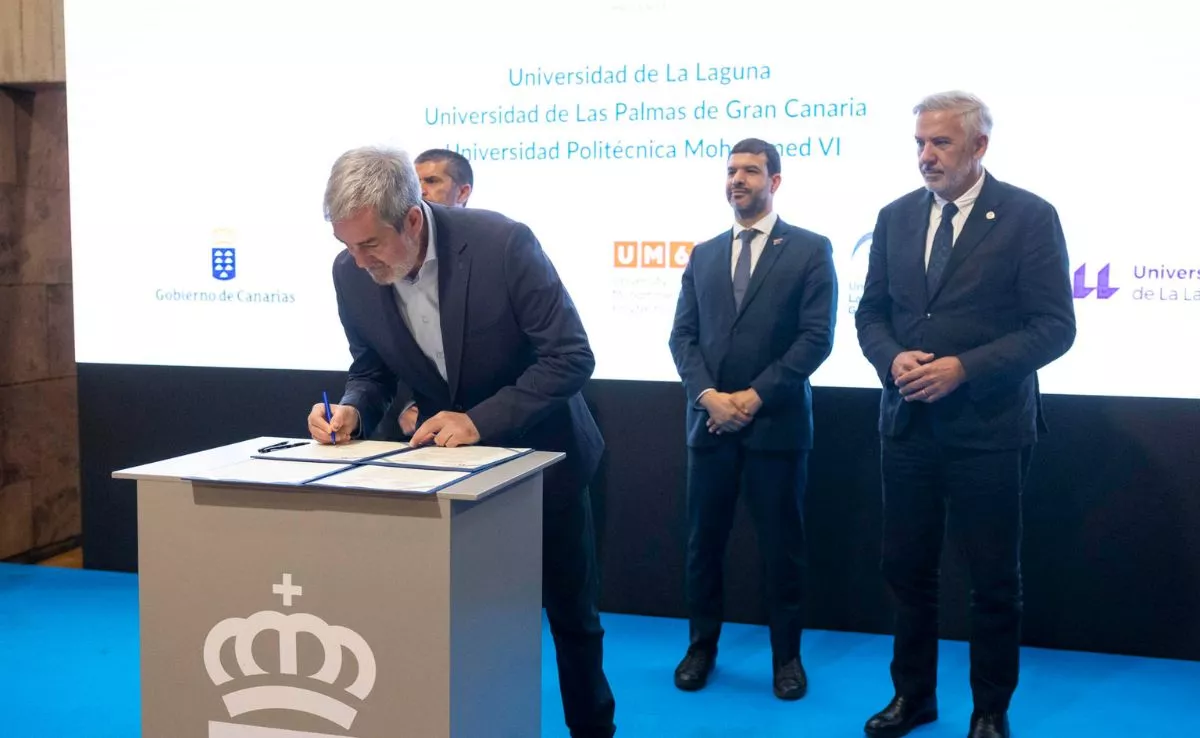
The Mohamed VI Polytechnic University of Morocco and the two public universities in the Canary Islands will develop joint projects focused on technological innovation and research in key areas such as water, energy, tropical diseases, desertification, and climate change.
This proposal was formalised on Wednesday with the signing of a collaboration agreement at the offices of the Presidency of the Canary Government in Santa Cruz de Tenerife between the president of the Mohamed VI Polytechnic, Hicham El Habti, and the rectors of the University of Las Palmas de Gran Canaria (ULPGC), Lluís Serra, and the University of La Laguna (ULL), Francisco García.
Witnesses at the event included the president of the Canary Islands, Fernando Clavijo, his advisor on Universities, Migdalia Machín, representatives from the business association CEOE, and leaders from scientific centres such as the Institute of Astrophysics of the Canary Islands (IAC), the Institute of Tropical Diseases and Public Health (IUETSPC), and the Technological and Renewable Energies Institute (ITER), among others.
For Clavijo, this is a “significant” agreement because, for the first time, the public universities of the Archipelago will embark on a stable scientific collaboration with a similar Moroccan institution. He framed this as a way to strengthen relations between the two regions, not only from an economic standpoint but also in terms of knowledge.
This represents an important step that will further tighten the ties between the Canary Islands and their neighbouring country. He stated that this will occur through research in areas “where we share concerns” and fields of knowledge.
El Habti highlighted the strength that connects the three universities in terms of research and indicated that this area will now be reinforced with the exchange of faculty and students, as well as stable scientific and technical collaboration over the next four years. He also argued that this approach will promote a joint “ecosystem” in the technological field, aiming to encourage participating researchers and, particularly, students to find a way to transfer their knowledge through “start-ups”.
Serra stressed how this agreement reflects a “strategic vision” where knowledge is the true engine of social progress. “Today is not a destination; it is the bridge that opens up the opportunity and responsibility to work on common challenges such as water, energy, and health security, and to sow the seeds for the three universities to transfer their knowledge,” he emphasised.
García described this agreement as “exemplary,” stating that “together with the Canary Government, research will be conducted on the common challenges faced by both regions because, he added, without science, there is no present.” He also reminded that ULL has “open doors to the African continent” and expressed his pleasure in collaborating with the Mohamed VI Polytechnic, the top institution in Morocco and also ranked among the 500 most important worldwide.
“This relationship will yield many benefits for the participating universities but, above all, for the societies we are committed to,” García specified, to which Rector Lluís Serra added, “this is the future, and I assure you that we will achieve very positive results in the short, medium, and long term.”
The advisor on Universities also celebrated the creation of a “solid alliance” among universities that will foster technological innovation and promote scientific and entrepreneurial talent. In fact, Machín committed her department to seek the necessary funding mechanisms for the projects that will be realised through this agreement, which she described as “scientific diplomacy” with a shared vision of challenges. She concluded that this “lasting and reciprocal” exchange is evidenced by four Moroccan engineering students who are being trained at the Technological Institute of the Canary Islands.














